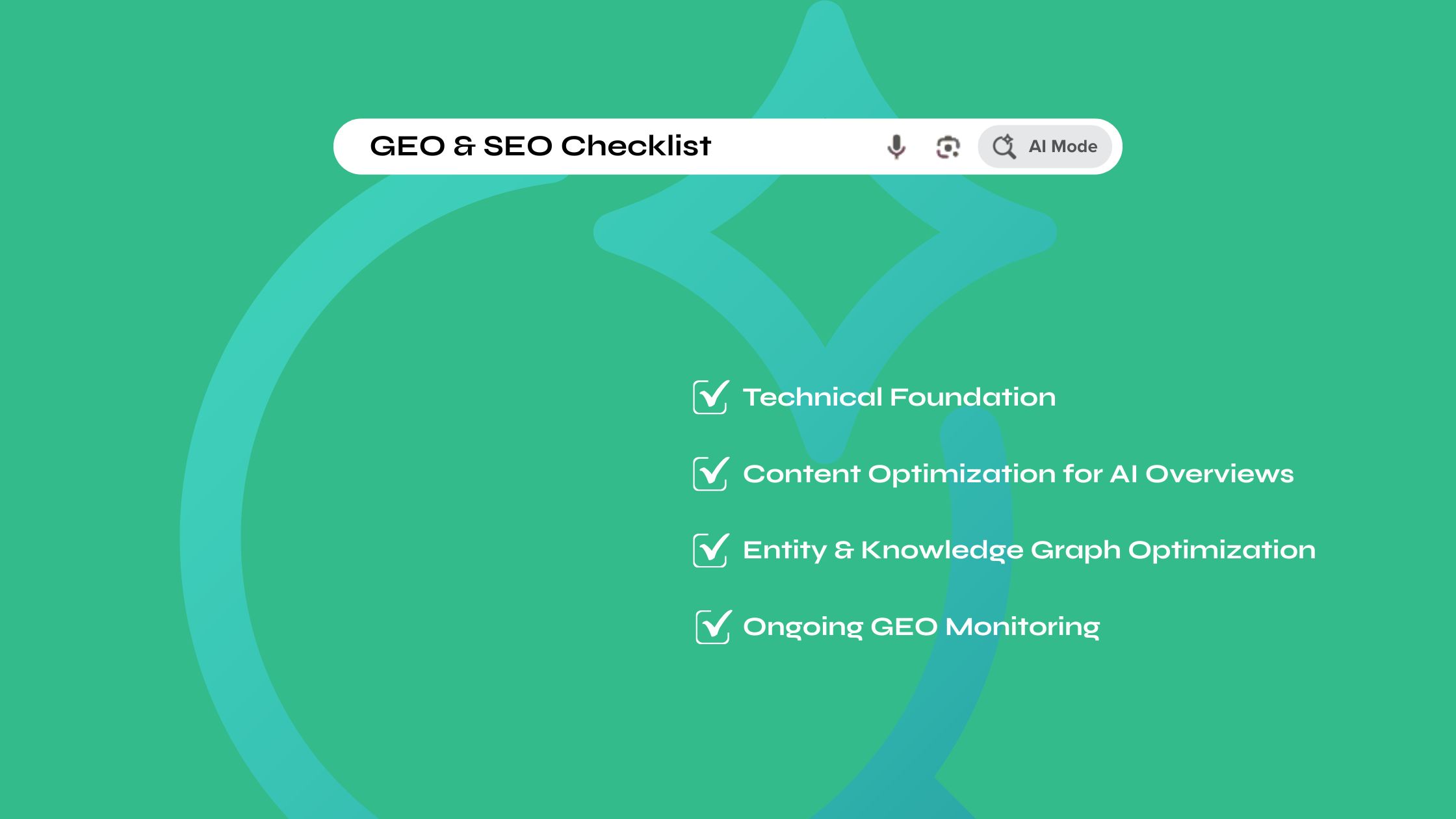Free GEO + SEO Optimization Checklist for AI Search Visibility
Why This Checklist Matters
- Search is changing. AI-powered engines like Google AI Overviews, Perplexity, ChatGPT, and You.com are shaping how users find information. These tools don’t just index pages — they generate answers. If your content isn’t optimized for AI discovery, you risk becoming invisible to your target audience.This guide combines traditional SEO best practices with Generative Engine Optimization (GEO) tactics so your content surfaces in AI-driven results.

GEO + SEO Optimization Checklist
1. Technical Foundation
A solid technical base ensures both search engines and AI systems can easily access and interpret your content.
- Page Speed & Core Web Vitals: Slow websites rarely make it into AI-driven answers. Optimize load times, interactivity, and visual stability.
- Mobile-First Design: Most AI engines prioritize mobile-friendly sites. Ensure responsive layouts.
- Indexation & Crawlability: Fix broken links, avoid redirect chains, and make sure key pages are crawlable.
- Structured Data (Schema.org): Use schema to help AI understand context (FAQ schema, HowTo, Product, Review, Organization).
Why it matters: AI models prefer structured and reliable data sources when generating answers.
2. Entity & Knowledge Graph Optimization
AI engines use entities, not just keywords, to establish trust and context.
- Define Your Entity: Make your brand, product, or service recognizable in the Knowledge Graph.
- Schema Markup: Add
Organization, Person, Product, or Service schema. - Consistent Mentions: Ensure your brand is cited consistently across the web.
- Authority Citations: Strengthen credibility with profiles on Wikipedia, Wikidata, Crunchbase, etc.
- Google Business Profile: Claim and fully optimize it with posts, photos, and Q&A.
Why it matters: The more signals AI has about your brand as an entity, the more likely you are to appear in AI-generated summaries.
3. Content Optimization for AI Overviews
AI models extract short, factual, and structured content.
- Answer-First Writing: Start sections with a direct answer, followed by details.
- Use Headings & Subheadings (H2/H3): Helps AI segment content.
- FAQ Sections: Q&A formats are often lifted directly into AI Overviews.
- E-E-A-T Compliance: Show Experience, Expertise, Authoritativeness, and Trustworthiness.
- Cite Sources: Use outbound links to authoritative sites to increase credibility.
- Original Insights: AI rewards unique data, case studies, or examples.
Why it matters: Concise, structured content has a higher chance of being quoted by AI search engines.
4. Local GEO + SEO (If Applicable)
For businesses with a local footprint, local optimization signals are crucial.
- NAP Consistency: Keep your business Name, Address, Phone number consistent across directories.
- Google Reviews: Encourage and respond to reviews to build trust.
- Local Schema: Use LocalBusiness schema and embed maps on location pages.
- Citations: Build authority through local directories, niche listings, and community mentions.
Why it matters: Local intent is frequently addressed by AI Overviews and maps integrations.
5. Content Distribution & Backlinks
AI search engines measure credibility through references.
- Contextual Backlinks: Focus on acquiring links from authoritative, niche-relevant sites.
- Brand Mentions: Even unlinked mentions help AI recognize authority.
- Content Repurposing: Share blogs as LinkedIn posts, newsletters, and micro-content.
- PR Outreach: Secure mentions in industry news, interviews, and guest articles.
Why it matters: AI systems surface brands that are talked about and trusted.
6. Ongoing GEO Monitoring
Optimization is not one-time. AI engines evolve, and so should you.
- Monitor Visibility: Track whether your content appears in AI Overviews and other AI search tools.
- Quarterly Audits: Re-run technical and content audits every 3 months.
- Update Content: Refresh outdated stats, broken links, and add new FAQs.
- Competitor Benchmarking: See what content is cited by AI for your target queries.
Why it matters: AI learns from the freshest and most consistent data.
Recommended GEO & SEO Tools
Here’s a curated list of tools you can use for each step in the checklist:
1. Technical & On-Page SEO
- Google PageSpeed Insights – Test Core Web Vitals, mobile usability, and speed.
- Screaming Frog – Crawl your site for broken links, redirects, and metadata gaps.
- Ahrefs Webmaster Tools – Diagnose crawlability and indexing issues.
2. Entity & Knowledge Graph
- Kalicube Pro – Map and monitor your brand entity across the Knowledge Graph.
- Google’s Structured Data Testing Tool – Validate schema markup for errors.
- Rankability GEO Audit – Check if your website is optimized for AI-driven search.
3. Content Optimization
- Frase.io – Build AI-powered briefs and optimize content for intent.
- Surfer SEO – Discover keyword gaps and optimize for semantic search.
- MarketMuse – Evaluate topical authority and content comprehensiveness.
4. Local SEO
- BrightLocal – Run local SEO audits and track ranking performance.
- Moz Local – Ensure NAP data is consistent across platforms.
- Yext – Automate local listings distribution at scale.
5. Backlinks & PR
- Ahrefs – Comprehensive backlink analysis and tracking.
- Semrush Link Building Tool – Find and manage outreach opportunities.
- HARO / Connectively – Get PR mentions by responding to journalist requests.
6. GEO-Specific Tools
- GetAIMonitor – Track if your brand/content appears in AI search engines.
- Rankshift GEO Audit – Uncover AI visibility gaps with tailored audits.
- Perplexity AI – Search and test whether your content is cited in answers.
- Geoptie (Search Engine Land) – Free GEO utilities and professional tools.
How to Use This Page
1. Start with the checklist to audit your site.
2. Use the recommended tools to close identified gaps.
3. Monitor your AI search visibility monthly.
4. Revisit this page quarterly — we’ll keep updating it with the latest GEO practices.
Ready to Build Your AI-Powered Marketing Stack?
We’ll help you choose the right tools, automate your workflows, and launch campaigns that actually convert. Let’s turn your marketing into a scalable, data-driven machine.
Let’s Discuss
Let’s Discuss

.svg)
